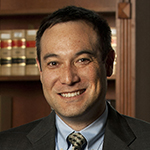John Inazu, JD, PhD, Associate Professor of Law
Most of us need reminders of hope in a broken world. Hope points to what we can’t yet see, to that which is not yet realized. It is often all that we have in the face of despair.
We catch glimpses of hope in both the ordinary and the extraordinary. I see them in the ordinary relationships that reveal common interests despite deep differences. I see them in the extraordinary acts of forgiveness extended by the family members of those slaughtered in Charleston.
When I am honest, though, Ferguson challenges my hope. And not just Ferguson, but Staten Island, Cleveland, Baltimore, Cincinnati, and hundreds of other stories that unfold every year around this country. These are stories without much hope. They are stories of violent deaths, some of them without justification or excuse, many of them avoidable. They are stories of angry words in all directions, words that turn human beings into objects of scorn. They are stories of broken trust, broken systems, and broken lives. And they are stories that cause many of us to throw up our hands in despair.
Some of us mask hopelessness with blind rage. If only “those people” would realize that Darren Wilson murdered Michael Brown (despite much evidence to the contrary). If only “those people” would realize that the circumstances that made Michael Brown’s death possible had nothing to do with racism and racial injustice (despite much evidence to the contrary). We fuel these beliefs with angry and defensive words, tweets, and Facebook posts. We forget that the people we target with our words are human beings.
Some of us respond to hopelessness with simplistic calls to action. If only we could get “our legislation,” “our policies,” or “our people” in place, then things could change. But these proposals alone will not overcome hopeless situations. The challenges lie as much in selfishness, narcissism, and pride as they do in policies and structures. And not just the selfishness, narcissism, and pride of “those people.”
Our individual complicity does not mean we give up on legislative or policy goals — one of the reasons that I am a lawyer is that I believe that laws and legal reform matter. I believe that there are selfish and power-hungry people in this region who have exacerbated the problems around us. I am grateful for groups like Arch City Defenders who are exposing those who have gained for themselves at the great expense of their less powerful neighbors. I am inspired by colleagues — both here and at nearby institutions — who labor for policy reforms. I am thankful for voices who will not let us forget that broken schools, abandoned businesses, and forgotten neighborhoods all play into the challenges that unfold in our criminal justice system. I am thankful for voices who push back against blanket condemnations of law enforcement and who point to other systemic problems — like broken families — that contribute to our hopelessness.
Hopeless situations need not stay that way. But meaningful change requires more than structural fixes, legal fights, and opinion pieces. It also requires people who are playing the long game and willing to take risks — people like Aaron Jennings and Kim Norwood. It depends upon imaginative partnerships across difference — like the recently launched Prison Education Project and the Marshall-Brennan Constitutional Literacy Project. It takes inconvenience, awkwardness, and sacrifice. And it means moving from the sprint to the marathon—trading adrenaline for endurance.
Hopeless situations also need hopeful people. We can look for signs of hope in the ordinary and the extraordinary moments that unfold around us. We might begin by reminding each other of our shared humanity and the innate desire that many of us have for authentic relationships and meaningful reconciliation. We can engage in the slow and difficult work of building friendships, asking questions instead of offering solutions, and listening to the needs of those around us.
As a university, let’s also put our time, money, and institutional priorities into this city — not because those efforts will be sufficient, but because we’re too big, too rich, and too local to do otherwise.
And let’s not lose hope.
